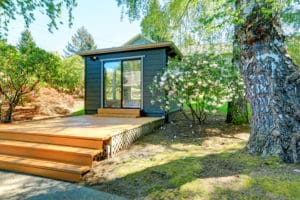The popularity of adding living space by building sheds and accessory dwelling units (ADUs) on one’s property has grown tremendously over the past decade. While some homeowners enjoy having a space for solitude to enjoy yoga, painting, or woodworking, others use the additional living space to house elderly family members or as a source of rental income, still, others would like to make it a detached home office. Land use regulations for these structures depend on their size and function.
What is the difference between a shed and an ADU?
 Different rules apply depending on whether the structure is a shed or ADU, and unfortunately, that line is a bit blurry. Typically, building an ADU will require multiple permits–from a general building permit to electrical, plumbing, and other specialized licenses. Sheds require far fewer if any permits.
Different rules apply depending on whether the structure is a shed or ADU, and unfortunately, that line is a bit blurry. Typically, building an ADU will require multiple permits–from a general building permit to electrical, plumbing, and other specialized licenses. Sheds require far fewer if any permits.
An ADU is meant to be a living space with fully functioning utilities that (depending on the zoning requirements) may be connected to the main living structure or independently connected to public utilities. That means it has amenities such as a sink, a toilet, and heating to make the space livable 24/7. Some people refer to these as “tiny homes,” although a tiny home is technically transportable while ADU’s sit on a permanent foundation. These structures are built to standard home building codes making the cost much higher than a shed.
On the other hand, sheds typically have no utilities and are meant for storage or occasional use. Yet, many property owners run electricity to sheds for lighting purposes or supply power for tools. Oregon Residential Specialty Code (ORSC) Section R105.1 describes sheds as this:
- “Non-habitable one-story accessory buildings with no greater than 200 square feet of floor area.”
- “Non-habitable one-story accessory buildings on parcels greater than 2 acres” if they’re “not more than 400 square feet in floor area and set back 20 feet from the property line.”
Additionally, sheds are usually limited in size. The State of Oregon requires property owners to obtain building permits when they wish to build (or alter) sheds that either:
- Exceed 200 square feet, or
- Are 200 square feet or less with a height exceeding 10 feet from the finished floor to the average height of the roof surface.
City and county planning departments may have additional stipulations, such as reducing the size requirement for a permit to 120 square feet. You will need to obtain a zoning permit regardless of the shed’s size, showing that the size and placement of the shed meets local requirements for setbacks and easements.
What are the limitations for building an ADU or shed on my property?
- ADU. Fortunately, the State of Oregon passed SB 1051 and HB 2001 in 2019 to allow more flexibility for property owners to add an ADU to their yards. In general, this law says that any city with a population greater than 2,500 or any county with a population greater than 15,000 must allow homeowners living in detached single-family dwelling zones to add at least one ADU to their property. Additionally, as long as the property isn’t used for rental income purposes, the ADU is not subject to off-street parking rules. This law was intended to help provide low-cost housing options as part of the solution to the state’s growing housing shortage problem.
- Sheds. Technically, the law doesn’t restrict you from adding a shed or regulate how many sheds you can build. However, whether or not you can add a shed or how many sheds you can build will be restricted by setback and easement provisions or other local regulations such as city codes that may limit the percentage of property covered by structures. Residents in communities with homeowner associations also need to ensure any building plans meet HOA contract requirements.
What’s the best way to navigate all the complex land use regulations for your property?
Before you sign the dotted line on the purchase agreement or start buying materials for your DIY structure, consult with Richard Stevens & Associates. We’re a land-use consulting firm located in Medford, Oregon. Our team can guide you through obtaining rural and urban land use planning permits throughout all Southern Oregon counties and beyond. With expertise at your side, you’ll be able to navigate the complex systems to obtain the land use permits you need for your next project. Give us a call at 541-773-2646 to get started!
PS – Stop by to see us at our NEW OFFICE location at 244 S. Grape Street, Medford, Oregon!
